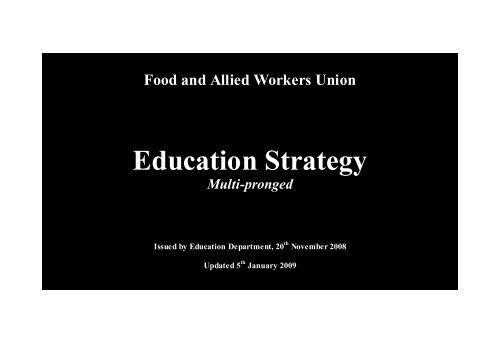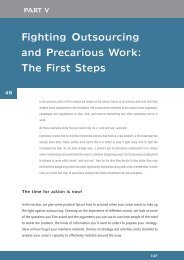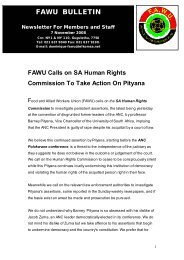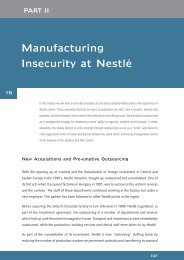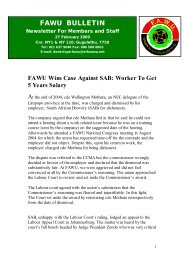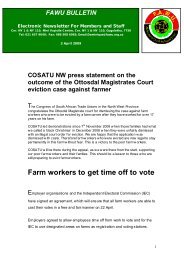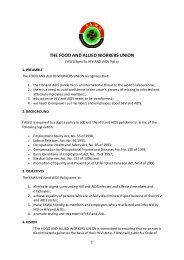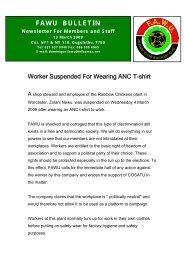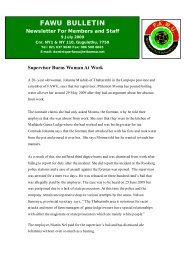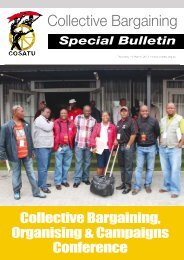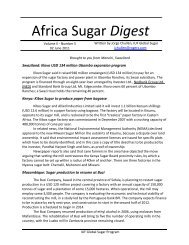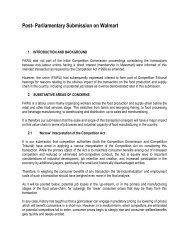Education Strategy - Food and Allied Workers Union
Education Strategy - Food and Allied Workers Union
Education Strategy - Food and Allied Workers Union
Create successful ePaper yourself
Turn your PDF publications into a flip-book with our unique Google optimized e-Paper software.
<strong>Food</strong> <strong>and</strong> <strong>Allied</strong> <strong>Workers</strong> <strong>Union</strong><br />
<strong>Education</strong> <strong>Strategy</strong><br />
Multi-pronged<br />
Issued by <strong>Education</strong> Department, 20 th November 2008<br />
Updated 5 th January 2009
Broad Framework:<br />
FAWU <strong>Education</strong>al <strong>Strategy</strong> [Multi-pronged]<br />
Mike Ntutela, <strong>Education</strong> Secretary<br />
20 th November 2008<br />
• Continued engagement with relevant departments on issues of planning, design, delivery (actual training), <strong>and</strong><br />
evaluation in a collective fashion<br />
• Conscious connection to our needs/challenges/resolutions/experiences based educational approach<br />
• Allowing for educationally sound practices which are based on the notions of Popular/<strong>Workers</strong> <strong>Education</strong><br />
• Focused selection/recruitment approaches which will be based on principles of non-racism, non-sexism, non-gender<br />
discrimination, etc<br />
• Acceptable mix <strong>and</strong> representation regarding age, gender, regional participation, etc<br />
• Dedicate our time <strong>and</strong> energy to both trade union <strong>and</strong> workers education approaches that build FAWU<br />
Aims: The <strong>Strategy</strong> will help us to<br />
• Develop common approach to our organisation’s education<br />
• Deepen <strong>and</strong> internalise a collective underst<strong>and</strong>ing of our ‘Model of Delivery’<br />
• Adequately co-ordinate our educational programmes through systematic processes of needs analyses, planning, design,<br />
delivery, <strong>and</strong> evaluation<br />
• March forward in unison through collective participation as we soldier on.<br />
2
Our Model of Delivery<br />
We will strive, at all times, to explore possibilities of supplementing these with low-cost mass-based workers education <strong>and</strong><br />
training using learnings from train-the-trainer workshop sessions, shopstewards training, etc .<br />
FAWU <strong>Education</strong><br />
Model/Philosophy/Belief/Practice<br />
Needs/Challenges/Experiences<br />
Context<br />
L<strong>and</strong>scape<br />
Global Picture Implications for FAWU<br />
Actioning<br />
Programming<br />
M & E<br />
(Mentoring/Support)<br />
3<br />
3
Specific <strong>Education</strong>al & Training Activities<br />
A pool of educators will be constituted to discuss <strong>and</strong> execute among ot her things:<br />
1. strengthen coherence <strong>and</strong> lines of co-ordination<br />
2. draw international experiences by engaging with lessons from solidarity campaigns<br />
3. agree strategic education resource organisations <strong>and</strong> international sister unions<br />
4. sharing of experiences through networks<br />
5. complementary approaches, support, coaching <strong>and</strong> mentoring<br />
6. cross-pollination of ideas on implementation strategies<br />
7. collective evaluation <strong>and</strong> on-going assessment<br />
8. embark on tracer (where are they & what are they doing-post training?) studies <strong>and</strong> impact assessment programmes<br />
on an annual basis.<br />
9. departmental needs examination followed by capacity training, education <strong>and</strong> human resource development<br />
10. integration of gender, sexism, racism, xenophobia, regionalism, etc into our education strategy<br />
4
Our Strategic <strong>Education</strong>/Training Pillars<br />
Strategic Pillars<br />
1)<br />
Shopstewards Training<br />
2)<br />
Staff Development (HRD)<br />
3)<br />
National/Provincial School<br />
• Leadership & Organisational Renewal<br />
• Legal capacity/Case H<strong>and</strong>ling/etc<br />
• Educator/Gender Development<br />
• Political Economy<br />
• Financial Management for Trade<br />
<strong>Union</strong>s<br />
NB: HIV & Gender Cut Across ALL AREAS<br />
4)<br />
Proactive & Responsive <strong>Education</strong><br />
Overall<br />
Co-ordination<br />
National/Provincial Educator<br />
<strong>Education</strong> Secretary<br />
National/Provincial Educator<br />
National/Provincial Educator<br />
Internal Support<br />
[Departments]<br />
<strong>Education</strong>/Organising (Bargaining)<br />
<strong>Education</strong>/Secretariat/HODs<br />
<strong>Education</strong>/Secretariat/HODs<br />
<strong>Education</strong>/Organising (Bargaining)<br />
5
5)<br />
Far mworkers & Dwellers Project<br />
6)<br />
Research & Development<br />
7)<br />
Topical Seminars (Quarterly)<br />
8)<br />
FAWU OD Forum (Bi-annually)<br />
Horizontal & Vertical Lines of<br />
Project Co-ordinator<br />
Research Officer<br />
<strong>Education</strong> Secretary<br />
<strong>Education</strong> Secretary<br />
<strong>Education</strong>/Secretariat/HODs<br />
<strong>Education</strong>/Secretariat/HODs<br />
<strong>Education</strong>/Secretariat/HODs<br />
<strong>Education</strong>/Secretariat/HODs<br />
This is subject to discussions with a pool of educators, those who might have been identified by education department, <strong>and</strong><br />
resource comrades within FAWU <strong>and</strong> broader labour movement.<br />
The education department will from time to time engage with Heads of Departments <strong>and</strong> the Secretariat on some of the<br />
following issues:<br />
• Plough-back strategies in the aftermath of training<br />
• Cost-benefit analysis (measure cost <strong>and</strong> i mpact )<br />
• Translation of agreements/resolutions into educational/training programmes<br />
• Decide who will attend which training in line with our needs-based approach<br />
6
• Agree strategic partners who will add educational, material, <strong>and</strong> financial value to our quest for capacity building<br />
• Consistent rolling out of educational programs which seek to build FAWU<br />
• Analyse local needs (personal <strong>and</strong> organisational) <strong>and</strong> feed into our planning processes<br />
• Make presentations to National/Provincial Executive Committee meetings, followed by submission of reports to<br />
Secretariat<br />
NB: Existing policy guidelines will remain supreme in providing necessary assistance in this regard.<br />
7


